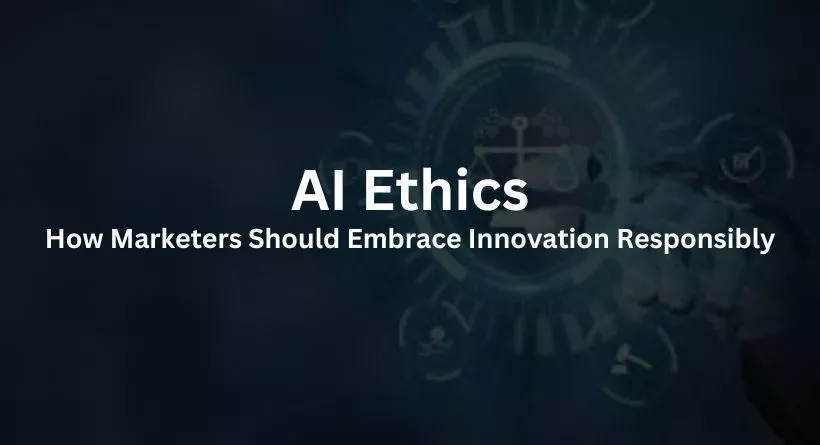
In a world increasingly driven by technology, artificial intelligence (AI) has become a pivotal tool in the realm of marketing. However, as AI’s role expands, so do the ethical questions surrounding its usage. This article delves into AI ethics and explores how marketers should responsibly embrace innovation to ensure a brighter and more ethical future.
The Intersection of AI and Marketing

AI and marketing have converged, creating a dynamic partnership that promises improved efficiency and effectiveness. Marketers employ AI for tasks ranging from data analysis to customer insights and personalized marketing strategies.
Benefits of AI in Marketing
AI brings a plethora of benefits to the marketing world. It enhances customer experiences by offering personalized recommendations and predicting consumer behaviour. It also automates routine tasks, allowing marketers to focus on creative and strategic endeavours.
Ethical Concerns Surrounding AI in Marketing
As AI permeates the marketing landscape, ethical concerns arise. These concerns demand serious consideration to protect consumers, their data, and their rights.
Transparency in AI
Transparency is key to ethical AI in marketing. Companies must be open about their use of AI, sharing how AI influences decision-making and ensuring consumers understand the AI-driven processes.
Data Privacy and Security
Protecting consumer data is paramount. Marketers must implement robust security measures and adhere to data protection regulations to prevent data breaches and unauthorized use.
Avoiding Discrimination and Bias
AI algorithms can inadvertently perpetuate biases. Marketers must actively work to eliminate bias in AI systems to ensure fair and equal treatment of all customers.
You may also like reading: Trends of AI in Business: Uses, Benefits, & Challenges
Balancing Personalization and Privacy
While personalization is valued, it should not infringe on consumer privacy. Marketers must strike a balance between offering tailored content and respecting personal boundaries.
The Role of AI Ethics Committees

Establishing AI ethics committees within organizations can help in shaping ethical guidelines for AI use in marketing. These committees can foster responsible AI development and usage.
Legal Frameworks and Regulations
Compliance with legal frameworks and regulations, such as GDPR, is essential. Marketers must ensure that their AI practices align with the law.
AI-Driven Content Creation
AI can assist in content creation, but marketers must oversee the process to ensure that the content aligns with the brand’s values and messaging.
Building Trust with Consumers
Building trust is paramount in ethical marketing. AI should be used to enhance trust, not erode it. Transparent and ethical AI practices foster trust with consumers.
Ethical AI Decision-Making
AI-driven decisions should be aligned with a company’s ethical standards. Marketers need to ensure that AI makes decisions that benefit both the business and consumers ethically.
Conclusion
In the evolving landscape of marketing, AI is a powerful ally. However, its ethical use is of paramount importance. Responsible marketing with AI not only ensures compliance but also builds trust and goodwill among consumers.
FAQs
What is AI ethics in marketing?
AI ethics in marketing pertains to the responsible and ethical use of artificial intelligence in marketing practices, encompassing transparency, data privacy, and fairness.
How can marketers ensure AI-driven content aligns with their brand’s values?
Marketers should closely oversee AI-driven content creation, ensuring that it adheres to the brand’s values, messaging, and ethical standards.
What are the risks of AI perpetuating bias in marketing?
AI algorithms can perpetuate bias by replicating historical data. Marketers must actively work to identify and eliminate bias to ensure fair and equal treatment of all consumers.
Why is transparency important in AI-driven marketing?
Transparency builds trust with consumers by providing clarity on how AI influences marketing decisions and processes.
How can companies build trust with consumers through ethical AI practices?
Companies can build trust by using AI to enhance transparency, privacy, and fairness in marketing, thus fostering trust and goodwill among consumers.





